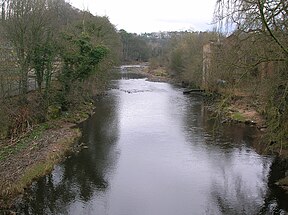River Ayr
| River Ayr (Uisge Air) | |
| River | |
|
The River Ayr near Mauchline
|
|
| Country | Scotland |
|---|---|
| Counties | Ayrshire |
| Tributaries | |
| - left | Lugar Water, Garpel Water |
| - right | Greenock Water |
| Cities | Ayr, Catrine, Muirkirk |
| Landmarks | Ayr Beach, Peden's Cove, Glenbuck Loch |
| Source | Glenbuck Loch |
| - location | Muirkirk, Scotland |
| Mouth | Ayr Harbour, Firth of Clyde |
| - location | Ayr, Scotland |
| Length | 65 km (40 mi) |
The River Ayr (pronounced like air, Uisge Àir in Gaelic) is a river in Ayrshire, Scotland. At 65 km (40 mi) it is the longest river in the county.
The river was held as sacred by pre-Christian cultures. The remains of several prehistoric sacrificial horse burials have been found along its banks, mainly concentrated around the town of Ayr.
The name Ayr comes from a pre-Celtic word meaning "watercourse". The town of Ayr was formerly known as Inver Ayr meaning "mouth of the Ayr", but this was later shortened to just Ayr.
The River Ayr has a watershed area of 574 km2 (222 sq mi).
The river originates at Glenbuck Loch in East Ayrshire, close to the border with Lanarkshire. It winds its way through East and South Ayrshire to its mouth at the town of Ayr, where it empties into the Firth of Clyde.
On its way, the river passes through the villages of Muirkirk, Sorn, Catrine, Failford, Stair and Annbank, as well as passing the location of (the now ruined) Ayr Castle. The largest settlements being Ayr, Cumnock, Catrine, Ochiltree, Muirkirk and Sorn.
Major land uses within the catchment area are agriculture, forestry, mining, leisure and recreation and urban development.
...
Wikipedia

